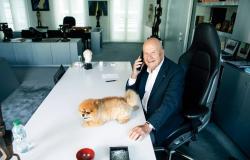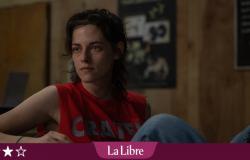Corsican director Caroline Poggi presented her second feature film at the Cinematographers’ Fortnight in Cannes, alongside Jonathan Vinel, her co-writer and co-director: “Eat the Night”, an intimate and apocalyptic drama shot in Le Havre, mixing cinema and video games. Their previous films have already been distinguished in Berlin or Toronto, but Cannes was, for them, a first. Our teams met them.
Delphine Leoni: Caroline Poggi, Jonathan Vinel, you are used to festivals. In 2015, you even received a Golden Bear at the Berlin Film Festival for your short film “As long as we still have shotguns”. Your first feature film, “Jessica Forever” was selected in Toronto. But this is your first in Cannes. What is so special about this festival? Why does everyone want to be in Cannes?
Caroline Poggi: The entire cinema profession is there, so it’s an extraordinary showcase for films, we know that they are going to be seen, that we are going to talk about them, for good or bad. We don’t really know in what sauce we’re going to be eaten, but in any case it’s a showcase, the largest in the world and for us, I admit, it was quite gratifying to be selected for the Fortnight because that it is a fairly historic selection in what it can offer. It was created by filmmakers, it has something quite experimental about it. It is a selection that opens cinema to other forms and allows spectators to move around.
DL: The great originality of your second feature film “Eat the Night” is to mix video games and cinema; a video game that you created, invented for the occasion. Is this virtual aesthetic part of your reality?
Jonathan Vinel: We are part of a generation that grew up in the virtual world, so even our relationship with cinema is influenced by all these games. We can almost say that we arrived in cinema through video games and so that was a bit of the idea, to bring together worlds that are not often put together. That was the whole point of the film.
DL: Throughout your filmography, you paint the portrait of a very young generation, which could be described as quite violent, and at the same time melancholy, disenchanted, while remaining very romantic. Is this your fantasy vision of this youth or does it correspond to reality?
CP: I don’t think it’s a fantasy. I think that it is a generation which also inherits a lot of all the errors of the past, a weight of history and which grows up in a violent world. And it’s true that the film, through the video game, shows violent images with people fighting, blood… But in my opinion, this is not the real violence. The violence of the world is that which we do not see, which is societal and is expressed in reality. We see it in the film, withs characters who are completely lost, stuck in the place where they grew up, who dream of leaving but who can’t. This idea of immobility, of the desire for elsewhere and of a rather harsh world…
DL: You are offering me a pole towards Corsica…
CP: It’s a bit like that, it’s something we experience when we grow up outside of big cities…
DL: Besides, “Jessica Forever”, your first feature film, was shot in Corsica, but the territory was not identified. This time, you filmed in Le Havre, and there, the territory is identified. Is it because it plays a role in your characters’ story?
CP: We wanted a large industrial city, not necessarily a port at first, but it’s true that Le Havre still revealed itself symbolically to be the strongest city to represent a node in the world. It talks about the market, moreover, something a little “dirty” about our heritage. And at the same time, it is an opening towards the sea, and there is this desire to escape. So it’s a very dark city – the film is still full of darkness – and, at the same time, there is a promise from elsewhere. The characters in the film feel this desire to always move violently, to be in the light. Le Havre was truly the perfect setting to stage this story.
Find an extract from the interview with Caroline Poggi and Jonathan Vinel, conducted by Delphine Leoni and Stéphane Lapera:
duration of the video: 00h03mn25s
Interview with Caroline Poggi and Jonathan Vinel
•
©D. LEONI – S. LAPERA / FTV
DL: Caroline Poggi, you trained at the University of Corsica, your first short film “Chiens” was made in 2012 as part of the faculty. Since then, you have directed all your films together. Jonathan Vinel, did you begin to develop a cinematic interest in Corsica through contact with your co-director?
JV: I discovered Corsica with Caroline. I didn’t know it at all, I had never been there. I find that it really is a territory which has an identity, a very strong history. It’s something that I miss a little, because I come from Toulouse and I feel less of this union between people that exists in Corsica. It is also a territory that has been little filmed and today there is a whole category of cinema and filmmakers who film this territory. I learned a lot from being around Corsica, from being around Caroline.
DL: You created a production company together based in Bastia, for what purpose?
CP: Our next films will take place in Corsica, Le Havre was a little interlude. We already shot a short film in February near Bonifacio. We really like filming Corsica: the places, the lights, the characters we find there, we are really attached to that. It was therefore logical to set up there. We live in Paris all year round, but 5 to 6 months a year, we are in Corsica. Making films in Corsica is also an excuse to come back more often and more quickly (laughs).






